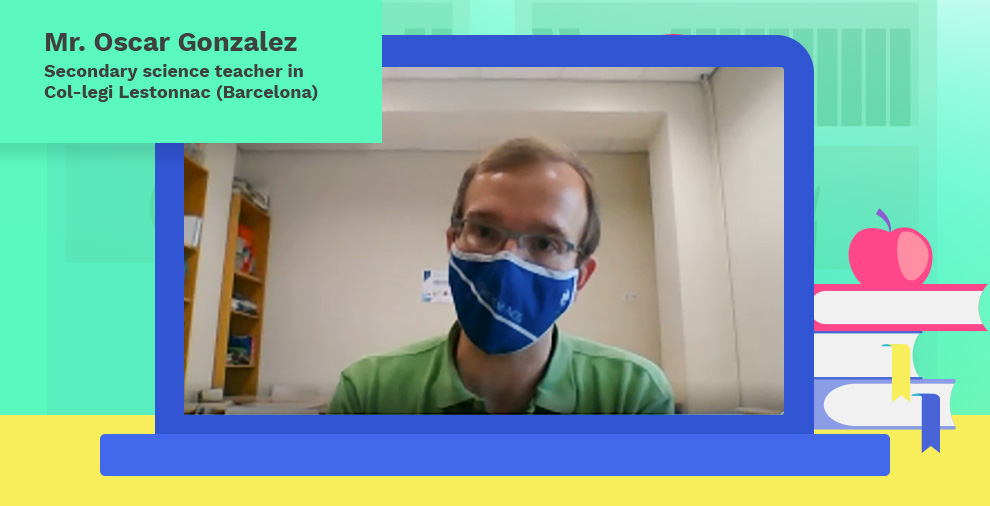News . Our Blog Oscar Gonzalez tells us about his experience in CONNECT pilot on Covid-19 prevention in schools

Oscar Gonzalez is a secondary science teacher in Col·legi Lestonnac (Barcelona), who participated in an open schooling pilot recently conducted in Catalonia, facilitated by The Living Lab for Health at IrsiCaixa, under the frame of CONNECT project.
The objective of the pilot was to address the prevention of Covid-19 in the school environment by monitoring and evaluating SARS-CoV-2 infection in schools and to elaborate recommendations for improving the prevention and control policies. In order to enhance the engagement of participants, the pilot had as innovative approach to involve the education community to participate as co-researchers in the research project “Escoles Sentinella” led by the Catalonia Local Government.
This CONNECT pilot consisted of a transdisciplinary and participatory research approach with a systemic perspective and had the participation of 44 teachers, 533 students and their families from 6 primary and secondary schools. Together with the support from scientists, the participants came up with 58 recommendations that cover the different areas of the system, beyond those of the health system.
Students presented the recommendations to improve COVID-19 prevention in the classroom in the “Escoles Sentinella” Congress on June 3rd 2021. More information HERE.
This is Mr. Gonzalez’s testimonial about his experience during the pilot
According to Mr. Gonzalez, getting involved in activities such as participatory research give us the chance to have a discussion with students using real and verified information.
In particular, concerning the topic addressed in CONNECT’s pilot in Catalonia “prevention of Covid-19 in the school environment”, Mr. Gonzalez highlights the impact that the amount of fake news regarding vaccination, Covid-19 detection tests, is having on the students, who are getting information that comes from different sources and, many times, this information is not correct.
Having the opportunity to discuss with the students, with the support from scientists involved in real cases and showing data coming from tests and surveys conducted by the students themselves, allows them to better understand what we try to explain. It gives a sense of veracity and allows students to contribute to disseminate truthful information and to give recommendations to improve societal challenges, which is one of the goals of education.
From this point of view, getting involved in participatory research brings science closer to students. For instance, as a science teacher, Mr. Gonzalez also teaches subjects related to the environment and he has joined other participatory science projects in the past, such as Bibliolab. This project enabled schools to have sensors to collect and analyse data, so students get close to science. They were able, not only to directly contribute to the research but also to involve their families and people from their community.
In Mr. Gonzalez’s opinion, this participatory approach is very interesting because it contributes to developing a science project which is not exclusively performed by scientists, but also by the education community.
Know more about Mr. Oscar Gonzalez:
Oscar Gonzalez is a secondary science teacher in Col·legi Lestonnac (Barcelona). He holds a PhD in Environmental Sciences from the Universitat Autònoma de Barcelona and during this time he has worked at the Institute of Earth Sciences “J. Almera” belonging to the Spanish Superior Research Council (CSIC). He is very interested in how to bring science to students and motivate them to use it. In addition to working at the school, he has also worked as an associate professor at the Chemical Engineering Department at the UPC (Universitat Politècnica de Catalunya) for 3 years and collaborates as master thesis supervisor in the master’s degree of secondary school teachers at the UNIR (Universidad Internacional de la Rioja) for the last 2 years.